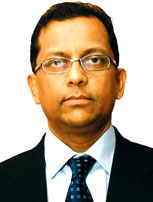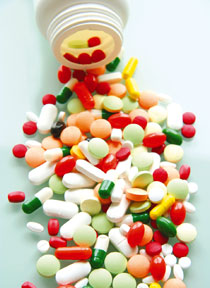|
Two - month buffer stock mandatory:
No more drug shortages - Health Secretary
by Shanika SRIYANANDA
|

Health Ministry Secretary
Dr. Ravindra Ruberu
|
Health Ministry Secretary Dr. Ravindra Ruberu assured that there
would not be a shortage of essential drugs in future as the Ministry has
instructed the relevant authorities to maintain a two month buffer
stock.
Dr. Ruberu, an ENT specialist, in an interview with the Sunday
Observer said the situation is gradually improving.
He said one of the main concerns of the Ministry was the eradication
of dengue and insisted on better public coordination to keep the menace
at bay.
Following are excerpts of the interview:
Q: Sri Lankaís health sector is being criticised very often
for grave irregularities. How do you assess the countryís current health
service?
A: We should be proud of our health service as we have
achieved higher standards in many areas of the sector. As evidenced from
international statistics, we have topped some of the Asian countries.
The country has a good health service.
Q: Donít you think that the health sector is facing a serious
crisis?
A: Yes, the important issue at the moment is the drug issue.
But it is gradually improving. There are some trade union issues not
settled yet.
 Our main concern is dengue control. This is a very important issue
that we are getting ready to tackle. We are monitoring the situation and
conducting several campaigns to keep the disease at bay. Our main concern is dengue control. This is a very important issue
that we are getting ready to tackle. We are monitoring the situation and
conducting several campaigns to keep the disease at bay.
The Health Ministry and other relevant authorities can do very little
to control dengue in the absence of active public co-operation. If each
household does its part controlling dengue would be easier. People
should clean their environs at least weekly.
The Ministry is to introduce BTI but I donít think we can control the
menace completely. We need public support.
Q: Is there any restriction by the Treasury on the purchase of
drugs?
A: Yes, it happened earlier and we did not receive the funds
on time. Now the situation is improving and as a result the expenditure
went up. There were other factors such as lack of coordination among the
relevant authorities and poor cash flow which had its impact on tenders.
Q: Does the Ministry implement any short and long term plans
to prevent shortage of drugs in future?
A: We have streamlined the system for then placing orders. We
have instructed the State Pharmaceutical Corporation and Medical
Supplies Department (MSD) to hold a buffer stock of essential drugs for
at least two months.
Now we order in drugs while maintaining a buffer stock.
Q: Does this mean that there would not be a shortage of drugs
in future?
A: We try our best to prevent shortages but there are
unpredictable things like tenders being cancelled or the drug failing to
conform to the required standard. Such situations are beyond our
control, though there would be a temporary shortage in certain essential
drugs.
Q: The health sector is always affected by trade union action.
How do you ensure better coordination for smooth administration.
A: The Ministry coordinates well with the trade unions now.
They have extended their cooperation to the Ministry. They also need to
understand that some of the issues are very complicated. We are trying
our best to negotiate with them to settle these problems.
Q: There are allegations that some of the patients admitted to
State hospitals including Colombo National Hospital were asked to buy
the necessary drugs from outside in the middle of the night. If so how
can the Ministry say that there is no shortage of drugs in State
hospitals?
A: I reject these allegations and I can assure you that there
is no shortage of drugs now in State hospitals. If it recurs then the
director of the respective hospital is answerable. Otherwise, there
canít be a shortage of drugs in any of the State hospitals as all
necessary drugs have been supplied without delay.
Q: But, it was reported that a patient admitted to the
Accident Ward of the Colombo South Teaching Hospital was asked to
purchase drugs from outside. How could patients take action against such
situations?
A: We shall take action if such complaints are addressed to
the ministry. So far we have not received any such complaints. There
will be temporary shortages of some drugs as we have to handle over
6,000 varieties of drugs.
There would be problems relating to distribution of drugs. I have
found myself that the drugs available in the hospital pharmacy have not
been supplied to the wards. There will be communication problems and the
hospital director needs to solve them. They can be rectified at primary
level.
These problems occurred due to the shortage of drugs in the central
drug stores, which supplies drugs to all State hospitals. If there is a
shortage of drugs the hospital authorities should inform the MSD. Lack
of financial allocation, should be brought to the notice of the
Ministry.
Q: The average man is not aware of these procedures. Do you
agree that drug shortages will reflect badly on the Ministry of Health.
A: Yes, complaints on drug shortages should be made to the
Director or the superintendent of the hospital without directing them to
the Ministry. They will look into the non-availability of these
particular drugs. If they are not available in the hospital pharmacy, he
will hold an inquiry. There is however a system to solve these issues.
Q: If the system works properly as you explained, patients
would not have to face the problem of buying drugs from outside in the
middle of the night!
A: If it is not working well we have to act on the complaints
we received. On the other hand, if people continued to complain to the
Ministry about each and every shortcoming, the Ministry would not have
time to attend to its duties. Therefore these issues need to be solved
at hospital level.
Yes, I understand the feeling of the patient when he is asked to buy
the drugs from outside. But the issue is a part of the big picture.
Q: Patients, who come to government hospitals complaint that
they were asked to have their tests done at the private laboratories, in
the hospital vicinity. The State hospitals have the best laboratory
facilities. How do you explain this?
A: I just cannot give an answer off-hand. I need to see the
reason for this situation. I agree that the State hospitals have the
best laboratory facilities.
But sometimes it happens that the particular testing facility is not
available at the hospital.
I donít think all tests are done in private laboratories but there
could be necessity for certain tests to be done outside. Sometimes the
hospital authorities are not investing in some of the expensive tests.
Other than these I donít see any reason to justify patients being
asked to have the testing done outside. All the tests should be done at
the hospital laboratory. In the major hospitals like the Colombo
National hospital all the routine tests should be done at the hospital
laboratory itself. |

